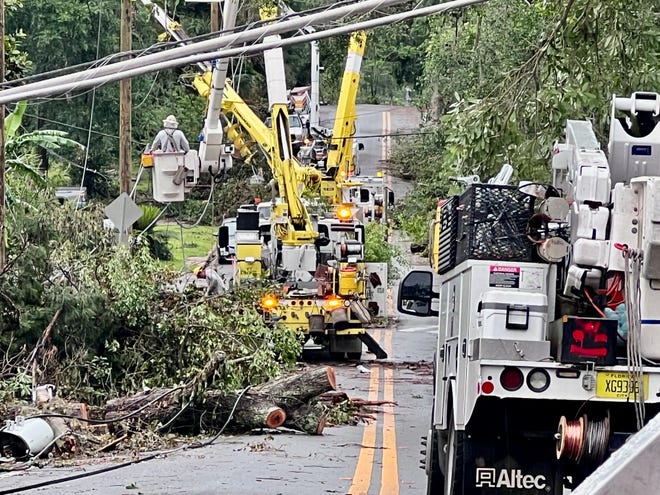Record heat in Miami. Record tornadoes in Tallahassee. Record coastal storm surge. Record rain in a single day. So why is climate change left out of state government discussions and action? This year, temperatures in the Gulf and Atlantic are unseasonably warm, and the hurricane forecasts are even more dire. But a tax exemption for hurricane equipment could solve the problem.

A lack of state leadership to address the real impacts of climate change has left cities and counties struggling to respond. The recent storms and tornadoes in Tallahassee and across the country are a frightening sign of things to come. The city's public works team worked hard to address sewage outfalls caused by recent record rains. With outside help, public works staff worked around the clock to address the devastating impacts that three tornadoes had on the power grid.
A little history may provide some perspective on a local level. Tallahassee began generating electricity from coal in 1902, and by 1921 it had built a wood- and coal-fired power plant, and later diesel fuel. In 1930, the city was ahead of its time, switching to green generation by purchasing nearly all of its electricity from West Florida Power's Lake Talquin Dam. By 1952, that wasn't enough, and the St. Marks Generating Station was installed, burning bunker oil. It also led much of the country by switching to clean natural gas in 1970 and adding solar power in 2017.

Despite having the largest airport solar system in the country and multiple rooftop panels, Tallahassee is unlikely to see any significant change in power generation without state incentives. A more immediate concern for residents is the impact of storms on power supply and reliability. In the 50 years I've lived here, we've gone from losing power every time there was a thunderstorm to being much more storm resilient.
But with more than 2,000 miles of distribution lines, more than 200 miles of transmission lines, 28 substations, 165 circuits, and tens of thousands of tall pine and oak trees, the potential for problems is great. Local concerns about protecting the tree canopy have led to a decline in tree pruning, and underground power lines are cost-prohibitive.
One benefit most people don't realize is that more than half of residential and commercial electric lines are underground. City ordinances require all new developments to install underground utilities, and that total is growing every year. This doesn't help older neighborhoods, though. Removing pine trees from roads and easements, where farms and plantations were once common, might help. But that takes time and money.
Another issue Tallahassee has faced recently is sewage spills during very heavy storms. Tallahassee has over 900 miles of gravity-fed pipes, over 143 miles of force-fed pipes, and 114 pump stations. Sewer overflows occur due to approximately 150 miles of shared storm and sewer pipes. Shared pipes provide significant cost savings in many locations, allowing both sewage and runoff to be treated before being returned to the aquifer. However, overflows remain frequent in some areas. The City is working to reduce the shared system and provide areas to contain spills and backups, but this is a difficult and expensive task.
Another area where some people have complained is localized flooding. Our capital city has the misfortune of not having beautiful riverbanks, but it has been spared flooding. Stormwater retention ponds, required for new developments, while not always attractive, have provided effective protection for downstream neighborhoods. Localized flooding remains a problem, especially in older and less developed areas.
Torrential rains have repeatedly damaged many homes and businesses, filling up gutters used as road drains, ponds that turn into lakes, and low spots where water has nowhere to drain.
None of these problems are new, and cities and counties are allocating significant funding to improve their systems. Despite the state's position that fossil fuels are the state's future, many deaths and damage will likely occur if the predicted hurricanes, tornadoes, thunderstorms, and heatwaves threaten local utilities. Local governments are doing their best to respond.
Hopefully, everyone in our community will remain patient and prepare for what future weather may bring, with or without climate change.

Jim Croteau of Tallahassee, Florida, is a retired educator and nonprofit administrator.
Join the conversation
Send your Letter to the Editor (up to 200 words) or Your Turn column (approximately 500 words) to letters@tallahassee.com. Please include your postal address for verification. If you are submitting Your Turn, please also include a photo and a sentence or two about yourself. Anonymous Zings! can also be sent here. Visit Tallahassee.com/Zing. Submissions will be published as space allows. All submissions may be edited for content, clarity and length and may be published by any division of the USA TODAY NETWORK.


